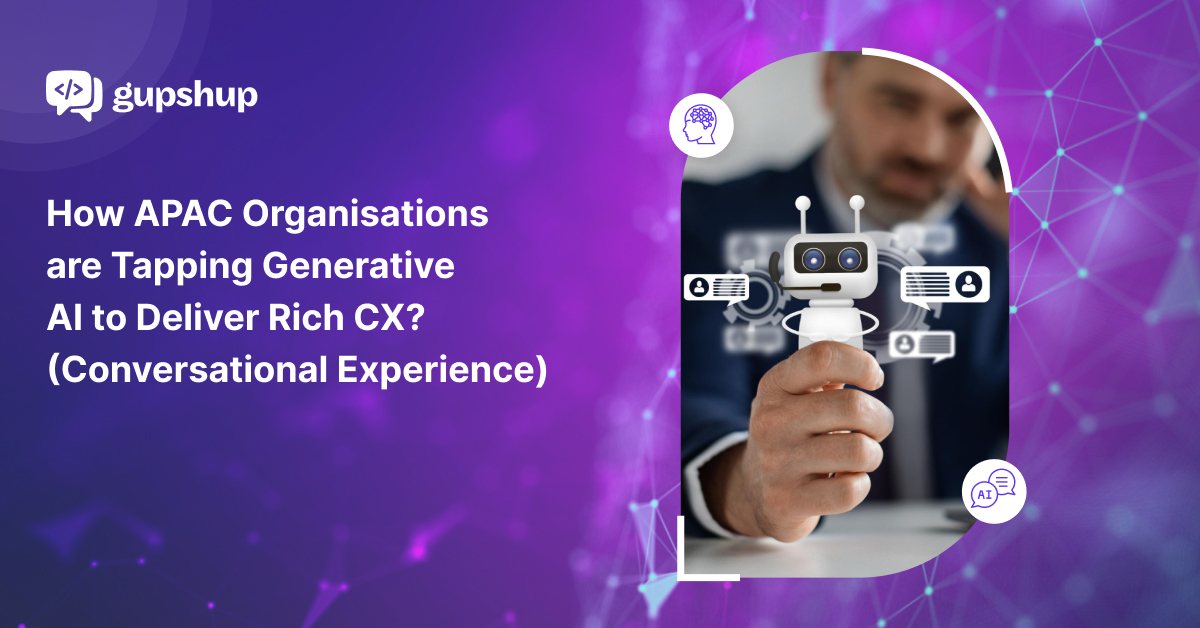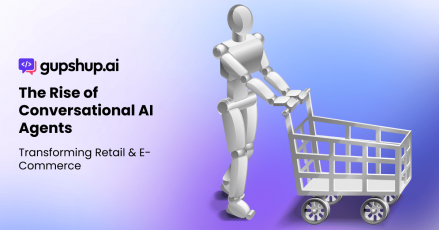How APAC Organisations are Tapping Generative AI to Deliver Rich CX? (Conversational Experience)

CEOs in Asia-Pacific are aware of the potential of Gen AI, but the majority are finding it difficult to develop and implement relevant strategies.
Recent research indicates that companies in the APAC region are increasingly using Gen AI to transform their approaches to customer engagement. More businesses are exploring opportunities to induct Gen AI-powered solutions to ease their process, as 43% of organizations in the Asia-Pacific region are presently looking into possible use cases for generative AI, and 55% of telecom and financial organizations are investing in this technology.
The heart of Gen AI’s appeal lies in its unparalleled ability to enhance conversational experiences. By enabling more personalized and contextually aware interactions, Gen AI is not just improving communication; it’s transforming it. Customers now enjoy more engaging, responsive, and customized conversations, elevating the overall conversational experience (CX).
This technological advancement is providing new innovative ways to connect with customers. APAC organizations are at the forefront, leveraging Gen AI to make each customer interaction not only efficient but also genuinely meaningful.
This article offers insights into the transformative role of AI in creating dynamic and engaging customer experiences, exploring how these technologies are changing customer interactions in the APAC market.
Role of Gen AI in APAC’s Digital Transformation

Businesses in the Asia-Pacific (APAC) region are known for their technological advancements. They are increasingly incorporating Generative AI to drive their digital transformation. This trend is evident across various sectors, with a notable impact on customer experience and operational efficiency.
Retail Industry:
Generative AI is playing a crucial role in sales and marketing within retail. AI service providers are aiding businesses in analyzing vast amounts of customer data, enabling the creation of tailored marketing strategies and personalized product recommendations. This degree of personalization, previously unattainable, is now achievable through AI-driven strategies, contributing to an anticipated 30% increase in sales by 2025.
Gen AI-powered conversational AI platforms like Gupshup are revolutionizing how brands interact with their customers. These platforms facilitate personalized and tailored interactions that mimic human conversation, leading to remarkable improvements in customer service interaction and efficiency.
The impact of Gen AI extends to supply chain management, where its application is rapidly growing. The market for AI in supply chain management is expected to reach $15 billion by 2027, growing at a compound annual growth rate of 45%. This growth underscores the transformative role of Gen AI in optimizing supply chain efficiency.
Banking and Financial Services Industry (BFSI)
Banks use Gen AI to convert customer calls into actionable data, automating operations and substantially reducing response times. In turn, this enhances the customer’s interaction with the bank, cuts down on pointless and repetitive inquiries, and decreases wait times for the user. In fact, according to recent surveys, 41% of retail bankers in Asia/Pacific are leaning towards making particular investments in GenAI. This trend highlights the growing recognition of Gen AI’s potential in transforming BFSI operations.
Healthcare
The adoption of this technology has gone beyond retail and BFSI. It has made an impact on the healthcare industry, too. These systems improve patient care by enhancing the accuracy and speed of diagnostics, showcasing Gen AI’s potential in advancing medical technology and patient outcomes.
However, the journey is not without its challenges. A fundamental change in conventional business operations and a thorough understanding of data security and AI ethics are necessary for integrating Gen AI. However, there are enormous potential benefits. Companies that pull through this transition successfully aren’t just ahead of the curve; they’re redefining it.
Transforming Challenges into Opportunities with Generative AI

While generative AI adoption has its own set of challenges, it also presents a plethora of opportunities for businesses in the Asia-Pacific area. Here’s how you can turn these obstacles into opportunities:
Intellectual Property and Data Privacy as a Foundation for Trust
The challenge of navigating intellectual property and data privacy concerns can be transformed into an opportunity to build trust with customers and stakeholders. Businesses can show their dedication to data security and ethical AI use by implementing strict data governance procedures, such as frequent audits, data encryption, and ethical AI frameworks. This proactive strategy not only protects against legal risks but also enhances the company’s integrity and reputation for dependability.
Businesses now have a chance to lead the way in governance and compliance due to the upcoming regulation of generative AI. Adopting regulatory standards early establishes a company’s reputation as a responsible and progressive leader, particularly in a diverse region such as APAC. Customers and partners are becoming increasingly concerned with compliance and ethical AI usage practices. So, a proactive approach can give you a competitive advantage in the market.
Leveraging AI Accuracy for Enhanced Quality Assurance
Businesses can create strong quality checks because generative AI work needs to be accurate and regularly reviewed. Organizations can ensure AI-generated content complies with customer expectations and brand values by implementing efficient review processes and monitoring systems. This dedication to quality can increase client loyalty and trust. It is one of the best ways of establishing a business as a pioneer in creative and ethical AI applications.
Workforce Development as a Strategic Advantage
Promoting an innovative and ongoing learning culture within the company is possible by addressing workforce concerns about AI adoption. Businesses can maximize the compatibility between human knowledge and AI capabilities by investing in skill development and educating staff members about the role of AI. This reduces worries about job security and boosts worker productivity and innovation, helping the business expand and gain a competitive edge.
Instead of viewing generative AI as a threat to jobs, businesses can leverage it as a tool to augment and enhance human roles. This perspective allows companies to use AI to reduce workloads, improve productivity, and create higher-value roles, leading to a more efficient and motivated workforce.
Enhancing Customer Experience
Gen AI significantly elevates the conversational experience, a critical aspect of customer engagement. Gen AI utilizes sophisticated algorithms and natural language processing techniques to interpret customer queries more accurately. This enables the companies to provide responses that are relevant to the conversation. Implementing Gen AI in conversational interfaces allows businesses to cater to individual customer preferences and behaviors. This creates a more personalized and satisfying customer experience, cultivating loyalty and a stronger emotional connection with the brand.
The Future Impact Gen AI in APAC
The Asia-Pacific region appears to be experiencing an exciting trajectory for generative AI. Implementing generative AI offers a significant breakthrough, speeding up and enhancing efficiency in AI operations associated with data generation. Because this combination makes real-time analytics and decision-making possible, industries are eager to utilize its capabilities daily. Managing hybrid cloud infrastructures is expected to become more advanced, and generative AI will play a key role in making these complex systems work better. The constantly learning and adapting generative AI models are set to have a significant impact. These developments will create new opportunities for innovation, customer interaction, and streamlining operational procedures.
Its expanding capabilities are ushering in a new era in customer service by paving the way for richer, more dynamic conversational experiences.
As these technologies develop further, they will play a significant and promising role in determining the future of customer experience, bringing about an era of improved communication and closer relationships with customers.




